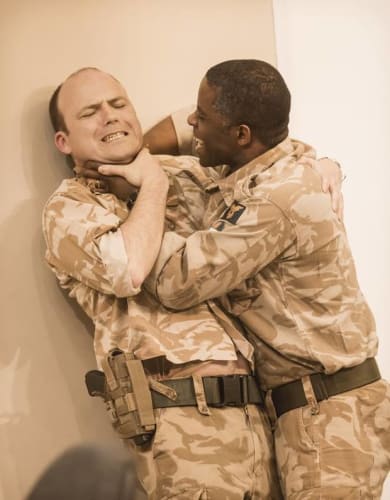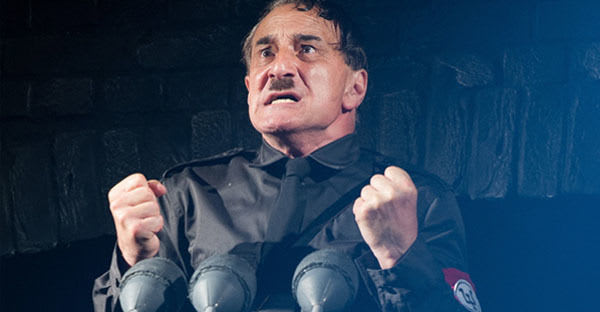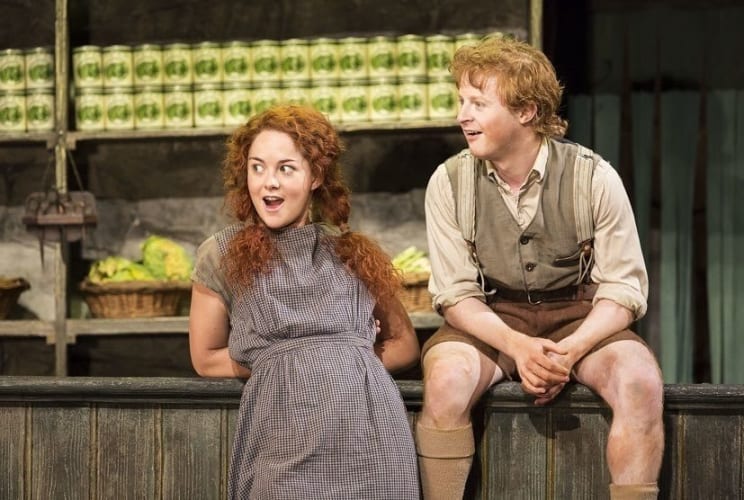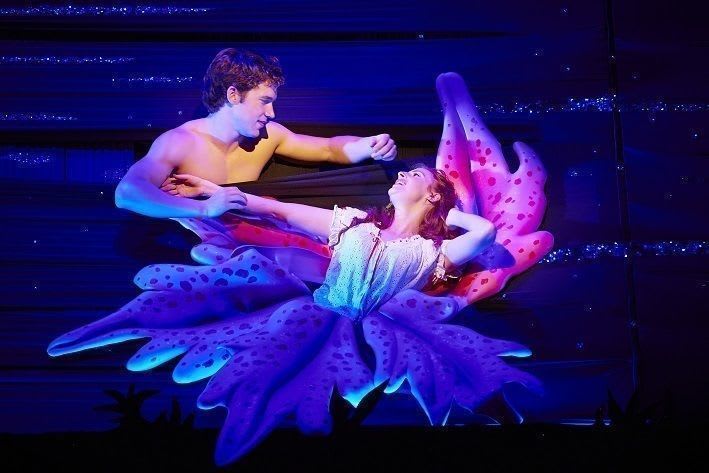Smaller Theatres
The London theatre scene seems to be growing at a remarkable pace. Although some venues disappeared from the capital during 2013, far more opened promising additional opportunities for those who wish to perform, direct or merely enjoy the thrills and spills of the stage as a spectator.
Before getting to the fringe, some good touring productions only got as close to the centre of town as Kingston, Richmond or Watford.
Having started life in the north east under the direction of Richard Wilson, Richard Bean's Smack Family Robinson was re-located to the south and the environs of Kingston where it was staged.
Keith Allen and Denise Welch led the way in a hilarious comedy that fitted into its new home perfectly but might have worried locals, who may not previously have realised that the stockbroker belt is home to the drug dealers and other ne'er-do-wells depicted.
Just along the road in Richmond, Headlong brought its adaptation of 1984 to visit for a week. Under the direction of Robert Icke, this adaptation was suitably chilling but also thought-provoking and visually impressive.
Earlier in the year, they had toured John Donnelly's modern version of The Seagull, including a stop at Watford Palace. Blanche McIntyre directed a play that looked and sounded very modern, which clashed with the sensibilities of the characters and story.
The Riverside Studios welcomed one of the Edinburgh sensations of 2012, Yael Farber's Africanised Mies Julie, which gave Strindberg a whole new meaning and looked just as good in London as it had in Edinburgh and no doubt elsewhere.
The year began with what might sound like a poetry reading, with Fiona Shaw cleverly animating The Rime of the Ancient Mariner by Samuel Taylor Coleridge at the Old Vic Tunnels.
At the Roundhouse, Robert Lepage’s distinctive Playing Cards 1 : Spades, the first in a mooted quartet, stopped off on a global tour. The piece comprised a number of not very closely connected stories set in Las Vegas and the nearby Nevada desert. Even if it didn't always make sense, a Lepage play is invariably worth a look.
Visiting the Unicorn, Complicite created a highly accessible children's show, Lionboy, adapted from the novels of Zizou Corder. This multicultural entertainment directed by Annabel Arden proved popular with old and young alike.
The programming at the Bush was eclectic to say the least. The year ended with Tom Wells’s fine new play Jumpers for Goalposts. This is ostensibly a play about low-level amateur football in Hull. In fact, this superficial veneer covered a rather beautiful gay love story.
Two actors were given the opportunity to turn playwright earlier in the year.
Cush Jumbo wrote a very personal solo piece that she also delivered with some aplomb. Josephine and I was somewhere between a biography of Josephine Baker and autobiography of Miss Jumbo. With song, dance and lots of storytelling, it overcame a rather trying if quite amusing opening.
Rory Kinnear is undoubtedly one of our finest stage and screen actors who, when he is not appearing in James Bond movies, could be winning awards as Iago. His theatrical debut as a writer, The Herd was a drama featuring the family from hell during a period of great stress.
It has to be said that Kinnear's strength as a writer is the opportunities that he gives to his cast rather than detail in plotting.
Money the Gameshow by Clare Duffy did what it said on the tin and very little more despite the efforts of performers Brian Ferguson and Lucy Ellinson. Its underlying attempt to educate viewers about high finance was less successful than the trick of whipping them into a frenzy at the possibility of winning or losing a few pounds.
This year's winner of the Pulitzer Prize for drama, Disgraced by novelist Ayad Akhtar, attempted to address the difficulties of living as Muslims in New York today without ever getting very far beneath the surface.
Three Birds by Janice Okoh came across as a kind of modern in-yer-face play about abandoned children running wild in a society packed with those out to hurt them.
Occasional visits to Soho proved to be very worthwhile. In particular, the wonderful Phoebe Waller-Bridge carried the day not once but twice in the studio space.
First, the theatre welcomed the transfer of Jack Thorne's Mydidae, an intense two-hander about love in the 24/7 world of work. This proved to be deeply moving thanks to the clever way in which layers of information were gradually revealed.
Her own solo play, Fleabag, already an award winner in Edinburgh, made its way down to London immediately after the Fringe ended and wowed audiences at Soho with its intoxicating but highly comical tale of love, death and sexual excess.
In the main theatre, Michael Buffong’s first directorial piece since taking over at Talawa, God's Property by Arinze Kene, was a gangster drama set in 1980s London that desperately attempted to rise above the level of soap operas and just about made it, primarily because of the efforts that it went to in its efforts to consider the problems of race inequality.
The Menier has long been far stronger on musicals, as demonstrated in the appropriate section of this review, rather than straight plays.
2013's pick was David Auburn's Proof, given a welcome revival under the direction of Polly Findlay. While she did not have the opportunity to direct a Hollywood superstar like Gwyneth Paltrow, Mariah Gale (opposite Matthew Marsh and Jamie Parker) is a highly talented actress who was well worth watching in this drama about higher mathematics and life.
The stage adaptation of Graham Greene's Travels with My Aunt by Giles Havergal was played almost entirely for laughs by an all-male cast swapping roles under the direction of Christopher Luscombe and was likeable enough without being a sensation.
At the Gate, Bruce Norris's Purple Heart was an enjoyable look at a dysfunctional American family in the aftermath of Vietnam. It may have contained more obfuscation than some like in their leisure time but made some pretty pertinent statements and got the appropriate laughs under Artistic Director Christopher Haydon.
Dances of Death featured in two parts of Strindberg's play in a new version by Howard Brenton. With Michael Pennington and Linda Marlowe expertly playing the mad old soldier and his ex-actress wife, the portrayal of a couple of horrors fighting each other tooth and nail, using family and friends as pawns, proved strangely enjoyable.
Despite its long-term, temporary move to Elephant and Castle, Southwark Playhouse maintained a high standard of programming after a brief initial blip.
A revival of wrestling drama Trafford Tanzi entitled Tanzi Libre did not bode particularly well but was soon forgotten as the riches unravelled.
The London transfer of Jekyll & Hyde, adapted by Jonathan Holloway from Robert Louis Stevenson's novella, proved fresh, partly because of the presentation by director Jessica Edwards, who created a white-face Victorian melodrama. The other new aspect was the casting of Cristina Catalina as a very feminine Dr Jekyll but convincingly masculine if boyish Hyde.
Alexander Solzhenitsyn does not have a reputation for cheerfulness and Matthew Dunster's production of The Love Girl and the Innocent was set in a gulag or prison camp. However, its portrayal of the irrepressibility of the human spirit in the grimmest of circumstances was enough to lift the heart.
Timberlake Wertenbaker's Our Ajax proved to be a modern version of an old, old tale, in this case updating Sophocles to Desert Storm days. With Joe Dixon in the lead, it was gritty and potentially controversial but never threatened to lose the attention at any point.
The Finborough presented its usual mix of ancient and modern. In the former category, there were two plays by J B Priestley.
The stronger was Laburnum Grove about a respectable suburban family trying to make ends meet during times of financial instability. The play maintains an air of mystery throughout, challenging its audience in the way that Priestley so much loves to do.
Summer Day's Dream had completely disappeared from view between its opening and this revival. It is an allegorical fantasy set way in the future in 1975. Then, another suburban family finds itself invaded by a trio of foreign visitors from Russia, America and India. What follows is a Shavian debate about the world circa 1949 when the piece was written.
London Wall by John van Druten followed a very successful run at the tiny pub theatre in Earl's Court with a richly deserved West End transfer, as proposed in the BTG review back in January. Set in a solicitor's office, it combines legal shenanigans with sexual impropriety in a heady mix that never lets up.
Somehow, Neil McPherson also managed to present the belated world première of The Hospital at the Time of the Revolution by Caryl Churchill. This may not be the best play that one of our most eminent writers has ever delivered but, even so, its portrait of a psychiatrist / political activist presiding over a mental hospital in Algeria during the political turmoil of 1956 was well worth seeing.
Dusa, Fish, Stas and Vi by Pam Gems was a popular hit at Hampstead in the mid-1970s and enjoyed an entertaining revival under the direction of Helen Eastman. She had the good fortune to showcase an excellent young cast of Emily Dobbs, Helena Johnson, Olivia Poulet and Sophie Scott.
Nothing is the End of the World (Except for the End of the World) by American playwright Bekah Brunstetter almost felt like two plays. In one strand, a drama of teen angst is played out in a Manhattan School dedicated to determined integrationist policies. In the other, a science-fiction fantasy is played out by robots.
Black Jesus was written by Anders Lustgarten, never a playwright to miss an opportunity to convey a political statement. In Zimbabwe, the activities of a state-sponsored assassin attached to a renegade political group rather like a modernised Hitler Youth were at the heart of the drama. The plotting risked losing out to the message but even so, viewers will have come away with a far better understanding of the politics of repression by the end of the evening.
Saer Doliau (Doll Mender) by Gwenlyn Parry was performed in Welsh, a great rarity in London. It was a quirky but highly enjoyable little drama about an ageing craftsmen who is forced to interact with a vibrant young biker lady. She attempts to bring his business up-to-date with the aid of a New Romantic apprentice with comic results.
Despite a strong performance from Owen Teale, The White Carnation by RC Sheriff seemed to, if it was needed, demonstrate that Journey's End was one of those unrepeatable freaks of nature from a playwright who seemingly was otherwise not in that class.
The Orange Tree in Richmond has long had a similar ethos to the Finborough, with a particular strength in discovering long forgotten dramas of high quality.
This year's sample included The Stepmother by Githa Sowerby, a 90-year-old play which had never previously been performed in the United Kingdom. It focused on the consequences after an elderly spinster left behind an unexpected will.
Rather than giving her money to one of several unpleasant relatives, she chooses a loyal companion, with amusing results.
Somerset Maugham's The Breadwinner, written a little later in 1930, is equally amusing playing out the dramas after a highly successful stockbroker falls on hard times, much to the distress of his grasping family.
The Man Who Pays the Piper penned a year later by G B Stern is a rare feminist work from that period. The protagonist, well played by Deirdre Mullins, might be headstrong as a pre-war teenager but a dozen years later, is supporting a family of hangers on thanks to a successful fashion business. Her attempts to escape generate the bulk of the drama.
The Arcola continues to produce good work in its new home. It was one of several London theatres to receive a visit from Laurence Boswell with an American play transferred from the Ustinov studio in Bath. In this case, Fifty Words by Michael Weller was a two-hander featuring Clare Price and Richard Clothier as a married couple with a love-hate relationship pushed to breaking point during the absence of their small son.
The theatre also welcomed a revival of David Storey's Home in which Amelia Sears directed a strong cast led by Jack Shepherd and Paul Copley. Set in a care home, nothing all that much happens but a great deal is discussed in a vaguely absurdist manner.
The Print Room in Notting Hill also enjoyed a Boswell transfer, in this case Amy Herzog's 4000 Miles. Set in Manhattan, it gave Sarah Kestelman a fantastic opportunity to prove that older actresses still know how to work an audience.
She played the grandmother of a lovable eccentric who has just cycled right across America but suffered serious loss along the way.
The Last Yankee by Arthur Miller takes place in a hospital for the terminally depressed. There, two couples, one poor one rich, follow different arcs in a subtle dissection of the Great American Dream.
Molly Sweeney by Brian Friel advances through monologues delivered by a trio of actors. Between them, they relate the tale of Dorothy Duffy's eponymous Molly, who has to decide whether to have an eye operation that will give her sight for the first time since infancy.
The writing is so good that visitors will inevitably be swept up by it and delighted by Abigail Graham's production.
Publisher James Hogan has also occasionally turned his hand to playwriting and, in what would originally have been a couple of upstairs bedrooms above the normal theatre, two short, related plays Ivy and Joan received an inevitably intimate production.
The first features a barmaid reminiscing after she discovers that she is about to lose her job. The second looks at a couple recently returned from Venice to face up to the realities of home life.
A newcomer in 2013 was at the Park Theatre, a stone's throw from Finsbury Park station. While still finding its feet, the venue showed promise for the future.
It opened in the larger 200-seat theatre with a small-scale American drama of industrial poisoning Melanie Marnich's These Shining Lives, which was never going to set the world on fire but did provoke thought.
Some of the better plays to date have taken place in the flexible 90-seat studio. The Barrier looked at the difficulties faced by Orthodox Jews and their atheistic neighbours just up the road in Stamford Hill. This wasn't the deepest of plays but did amuse at times and allowed visitors to consider what it means to live in our multicultural society today.
Also in the small space was Little Black Book, a two hander written by Jean-Claude Carrière the long-term collaborator of Luis Buñuel. This intense little drama featured the relationship between a lothario lawyer and mysterious young female visitor (respectively played by Gerald Kyd and Jenny Rainsford) and put them under the microscope most effectively.
At Tara Arts, The Domestic Crusaders by Wajahat Ali wittily shed light on the cultural issues faced by a Pakistani-American family based in San Francisco.
Jermyn Street saw a revival of Graham Greene's The Living Room, apparently the first time that the play had been seen in London in six decades. Tuppence Middleton led the cast as a young woman thrown together with elderly relatives in a most uncomfortable battle between generations.



